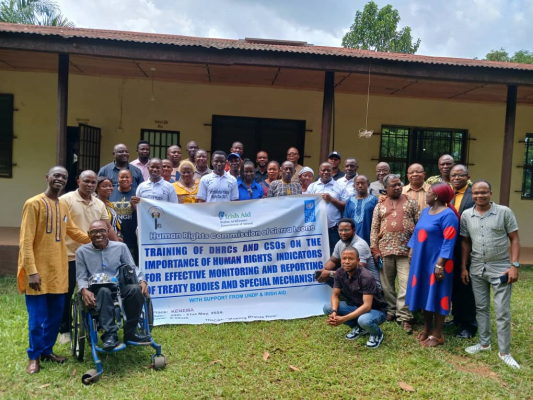HRCSL NEWS AND EVENTS

Posted By: Millicent Kargbo ⇒ Posted Date: 7/1/2024
The Directorate of Treaty Bodies Reporting and International Mechanisms of the Human Rights Commission of Sierra Leone (HRCSL) concluded a four-day training of selected members of District Human Rights Committees (DHRCs) and Civil Society Organisations (CSOs) in the east and southern regions respectively on the Importance of Human Rights Indicators for Effective Monitoring & Reporting of Treaty Bodies and Special Mechanisms. DHRCs and CSOs are important partners in monitoring the status of implementation of recommendations from Treaty Bodies and Special Mechanisms and as such, enhancing their knowledge will enable them to monitor and report on the implementation of recommendations effectively. With support from UNDP and Irish Aid, the main objective of the training was to strengthen the capacities of members of DHRCs and CSOs in monitoring and reporting on the implementation of recommendations from Treaty Bodies and Special Mechanisms. A total of 61 participants attended the training in Kenema (22 males and 8 females) and Bo (20 males and 11 females) from the 20th to 23rd May 2024. Facilitators took participants through key International, Regional, and Domestic Instruments/Laws, Special Mechanisms/UPR Processes, Functions of Treaty Bodies, and the Role of NHRIs and CSOs in Treaty Bodies and UPR Processes, among others. Participants exhibited increased awareness and comprehension of the topics discussed. They expressed commitment to becoming agents of change within their respective communities, by monitoring and reporting on UPR and Special Mechanisms’ recommendations, using the human rights indicators. Jarai Barrie, Chairperson of the Bo District Human Rights Committee said the presentations, especially the one on key international, regional, and domestic human rights instruments/laws, have broadened her knowledge and will help DHRCs to monitor and report on the implementation of recommendations of the UPR and Special Mechanisms. She added that understanding the issues better will enable them as DHRCs and CSOs to educate people in communities on the UPR process, as well as Treaty Bodies and Special Mechanisms and their recommendations. Mr. Kenneth Amadu said “With the knowledge acquired, I am now fully equipped to remind government about their obligations to Treaty Bodies and Special Mechanisms recommendations and why the State needs to implement the Treaties they have signed up to.” Vice Chairperson of HRCSL, Victor Idrissa Lansana acknowledge the contributions of DHRCs and CSOs over the years, referring to them as the foot soldiers and committed partners of the Commission. According to him, there is no way the Commission could succeed in the protection and promotion of human rights without the support of DHRCs and CSOs. He expressed optimism that at the end of the sessions, participants will better understand what human rights are, and how to monitor and report on UPR and Special Mechanisms recommendations. ©HRCSL Communications Team